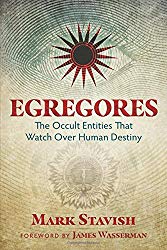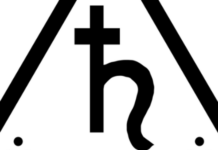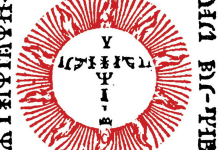
Egregores: The Occult Entities that Watch Over Human Destiny, by Mark Stavish, forward by James Wasserman
Inner Traditions, 9781620555774, 140 pp. (incl. appendices, notes, bibliography, and index), 2018
In Egregores: The Occult Entities that Watch Over Human Destiny, Mark Stavish argues that all egregores are restrictive forces from which we must be freed,1 and he offers suggestions for how we might do this. I was really excited to review this book when I first saw it. When I was a budding chaote, the three things that received the most attention were sigils, servitors, and egregores — roughly in that order. However, there are definite problems with this text — many of which leave me utterly confounded.
James Wasserman‘s forward is full of nationalistic, alt-right nonsense that repeatedly swerves into outright racism (such as when he demonstrates a complete lack of historical understanding or sympathy for the people of Iran).2 It isn’t surprising, given his self-presentation online, but it is disheartening. He denigrates propaganda and fake news, but instead of Fox, he means The New York Times, NBC, and CBS.3 Ok, then. I almost put Egregores down in frustration before I’d even really started, as I was concerned that nothing good could come of it, but the topic is an important one, so I decided to give Stavish the benefit of the doubt — with mixed results.4
We should probably pause here to define our terms. The word egregore is derived from the ancient Greek word egrḗgoros, which means “watching” or “waking.” However, our modern understanding of the word began to solidify in the 1990s, and “egregore” has come to mean a collectively-generated thoughtform that can act independently of its creators, but which requires “food” to sustain it, usually energy of some kind. In chaos magick, a particularly strong collective working can generate an egregore. It could begin life as a sigil used to activate a servitor that then had the potential to evolve into an egregore.5
On the topic of tulpas, he invokes Alexandra David-Neel (1868-1969), the Belgian-French explorer and travel writer who introduced this concept to western audiences in 1929 with Magic and Mystery in Tibet. In her understanding, tulpas were a kind of independent entity or “thoughtform,” and in Stavish’s understanding, this maps directly onto our modern understanding of “egregore.”6 However, there are, of course, differences that go unremarked on.
Similarly, the Hermetic Order of the Golden Dawn‘s initiatory “link,”7 Jean Dubuis’ “space brothers,”8 and Robert Masters and Jean Houston’s thoughtforms and “Group Spirit,”9 among others, all find shelter under Stavish’s egregore umbrella.
Indeed, he actively discourages defining egregores (as I’ve done above).10 Yet, without these distinctions, we we lose the language used to understand these entities as they have been explained in their specific historical and cultural contexts. Meaning changes with usage over time, and that’s perfectly natural. Tracing the history of these shifts in meaning has value, and claiming that none of this matters invites and encourages ignorance.
Stavish quotes extensively from source texts, and provides little elaboration on the themes developed within them, except to state how they apply to egregores. The only service this does for the reader is in providing references to other texts where one might find this information — and there it will be more detailed and contextualized within the writer’s larger narrative. And this hits on what is missing from Stavish’s work: context.
Indeed, his transcultural and transhistorical approach to defining egregores flattens disparate entities, and loses the nuances between them in doing so. For example, in a section on offerings to the dead in ancient Egypt, Stavish suggests “food, drink, tobacco, and prayers.”11 Yet, tobacco wasn’t introduced to the “Old World” until Christopher Columbus brought it back from the Americas in the 15th century. Tobacco is used as an offering to the spirits and chiefs or elders in some First Nations bands in what has become the colonized lands of North America, but that’s hardly the same thing.
Further, Stavish’s critique of Tibetan Buddhism seems a bit odd, especially when he writes that its adherents “claim[] to want enlightenment and the freedom it mandates, [but instead] they have simply traded one egregore for another,” as if this is a bad thing.12 In doing, he presumes they don’t have the agency to make a conscious and deliberate choice on their own. This disparaging tone in some ways echoes Wasserman’s presumptive and self-aggrandizing alt-right forward. It doesn’t sit well.
Entire pages worth of text are quoted from Tarot by Polish esotericist Mieczyslaw Demetriusz Sudowski (1897-1971), writing as Mouni Sadhu — including what should be a highly contentious passage: that which refers to “guards and masters of the white race” — and, yes, he means what you think he means.13 Weirdly, Stavish doesn’t bother address it. Or Jean Dubuis’ racist attack on an entire religious movement, Islam.14 What are we to take from this?
He flatly states that he does not believe in egalitarianism within occult movements.15 He demands a hierarchical structure because he assumes that a leader is required to direct an egregore, and ignores the possibility that it can be influenced by a collective, or that any other form of organization could emerge that would satisfy its needs. This seems incredibly short-sighted, but even so, a stronger justification is required than what is given in order to make such a bold claim. Then again, he has no problem citing long excerpts from an avowed fascist, Julius Evola, particularly sections in which he demonstrates himself a conservative pining for a non-existent golden age.16
Given that the intent of Egregores is to provide readers with the tools to make “conscious and informed decision[s] about your participation in various egregores,” it strikes me that at least some of these choices must also be conscious and informed.17 Whether it’s the gendered language,18 forwarding culture from the United States as if it’s a worldwide default,19 repeatedly citing fascists and racists throughout the text without comment, or asking a toxic right-wing nationalist to write the forward to his latest book, this book seems geared to bring out the worst in people, despite the loftiness of its stated goal.
The most valuable chapter is the last one, “Freeing Oneself from the Influence of Egregores.” Suggestions such as limiting contact with people and activities associated with the egregore,20 and making the sign of the cross and invoking the Christian god are given.21 However, also he notes that removing the ongoing influence of an egregore is demanding work, and suggests a timeline of approximately one month per year associated with the egregore in question is required to exorcise it.22 The final note on diminishing an egregore’s influence comes straight out of chaos magick, and concerns controlling the narrative, or that one must believe a thing for it to become real for all intents and purposes.23
Despite some genuinely good advice in this last chapter, there are so many reasons why I can’t in good conscience recommend Egregores: The Occult Entities that Watch Over Human Destiny. If you’re interested in learning more about the topic, there are better resources available, such as some of the non-racist texts he mentions that actually discuss egregores.
- p. 106 [↩]
- p. x [↩]
- p. x-xi [↩]
- Stavish doesn’t comment on Wasserman’s forward, and indeed, forwards aren’t usually commented upon by the authors they’re written for, but this one stands out for the ironic way it introduces the reader to the consequences of a toxic egregore corrupting one’s sense of justice, compassion, and truth. Now, unlike Stavish, I don’t think egregores are necessarily malevolent forces (he recommends extraction from the benign ones), but surely this much hate ought to be addressed as the influence of a negative egregore, or perhaps even a network of them? [↩]
- For example, see Fotamecus. [↩]
- p. 11-12 [↩]
- p. 26 [↩]
- p. 56-57 [↩]
- p. 62-63 [↩]
- p. 111 [↩]
- p. 19 [↩]
- p. 21 [↩]
- p. 35 N.B. Mouni Sadhu renders this phrase in all-caps, but I see no need to shout hate-speech. It’s bad enough you have to read it. Sorry. [↩]
- p. 57 [↩]
- p. 52 [↩]
- p. 59 [↩]
- p. 7 [↩]
- I mean, it’s 2018. Who still assumes a solely male audience? [↩]
- p. 9 N.B. To Stavish, “popular culture” means “western culture,” or “the culture of the United States,” more specifically. [↩]
- p. 97 [↩]
- p. 102 [↩]
- p. 109 [↩]
- p. 110 [↩]









